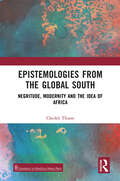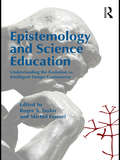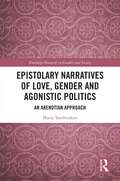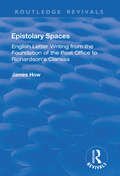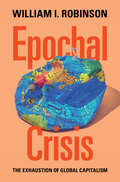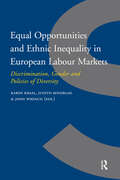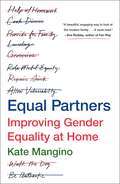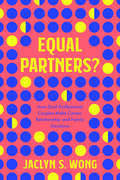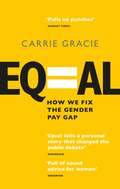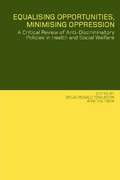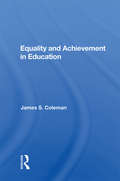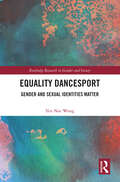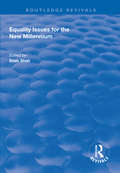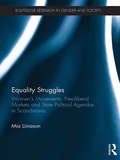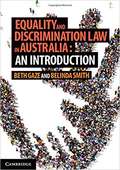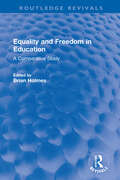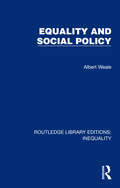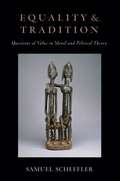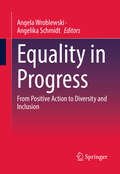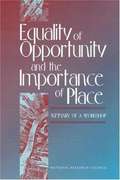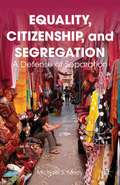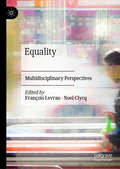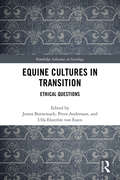- Table View
- List View
Epistemologies from the Global South: Negritude, Modernity and the Idea of Africa
by Cheikh ThiamThis book argues that the pervasiveness of the modern paradigm and its corollary, the colonial matrix of power, have led scholars of Negritude to think of Leopold Sedar Senghor’s work either as an anti-thesis to the anti-Blackness constitutive of European modernity or as another manifestation of the West as subject of history. As opposed to this tradition, the book reads Negritude through the prism of endogenous African world views without the filter of the modern Western paradigm.Print edition not for sale in Sub Saharan Africa.
Epistemologies of African Conflicts
by Zubairu WaiThis book offers a bold, ground-breaking epistemological critique of the dominant discourses on African conflicts. Based on a painstaking study of the ways in which the Sierra Leone civil war has been interpreted, it considers how Africa is constructed as a site of knowledge and the implications that this has for the continent and its people.
Epistemology and Science Education: Understanding the Evolution vs. Intelligent Design Controversy
by Michel Ferrari Roger S. TaylorHow is epistemology related to the issue of teaching science and evolution in the schools? Addressing a flashpoint issue in our schools today, this book explores core epistemological differences between proponents of intelligent design and evolutionary scientists, as well as the critical role of epistemological beliefs in learning science. Preeminent scholars in these areas report empirical research and/or make a theoretical contribution, with a particular emphasis on the controversy over whether intelligent design deserves to be considered a science alongside Darwinian evolution. This pioneering book coordinates and provides a complete picture of the intersections in the study of evolution, epistemology, and science education, in order to allow a deeper understanding of the intelligent design vs. evolution controversy. This is a very timely book for teachers and policy makers who are wrestling with issues of how to teach biology and evolution within a cultural context in which intelligent design has been and is likely to remain a challenge for the foreseeable future.
Epistolary Narratives of Love, Gender and Agonistic Politics: An Arendtian Approach (Routledge Research in Gender and Society)
by Maria TamboukouThis book revolves around epistolary narratives of women political theorists and activists, following traces of Hannah Arendt’s philosophical approaches to love and agonistic politics. Arend’s interlocutors are four revolutionary women in the long durée of the nineteenth and twentieth centuries in Europe and the USA: the romantic socialist Désirée Véret-Gay, the Marxist Rosa Luxemburg, the anarchist Emma Goldman and the labour activist Rose Pesotta. The book’s central argument is that Arendt’s philosophical thought can throw light on dangerous liaisons between love, gender and agonistic politics, further making connections with feminist ruminations around love as an existential force in the ephemeral constitution of the female self in modernity. Drawing on extended research with physical, digital and published archival collections, the book responds to the challenges of ‘the digital turn’ and highlights the importance of memory work, as a way of understanding the lasting effects of the past on the present. As such, Epistolary Narratives of Love, Gender and Agonistic Politics will appeal to scholars of sociology and gender studies with interests in research methods – particularly archival methods – the work of Arendt, feminist thought and memory studies.
Epistolary Spaces: English Letter-writing from the Foundation of the Post Office to Richardson's "Clarissa" (Studies In Early Modern English Literature)
by James HowThis title was first published in 2003. The author explores and describes the nature of what he terms "epistolary spaces", phenomena that came into being as a result of the foundation during the 1650s of a Post Office available to the general public. He focuses on the history of letter-writing by English men and women, and in so doing he shows how the imaginations of letter writers were affected by the increasingly cheaper, faster and more efficient postal services that were developed throughout the time period covered. The book makes a detailed study of five "real" correspondences, reading the letters in terms of their social and political interest and addressing such concerns as class, gender, collections of model letters and the importance of London to English epistolary spaces. How portrays epistolary spaces variously as arenas in which to explore the new urban culture of London, in the love letters of Dorothy Osborne (1652-4); courtly enclaves, in the diplomatic letters of the dramatist Sir George Etherege (1685-9); and aristocratic redoubts, in the correspondence between the Countesses of Hertford and Pomfret (1739-41). Finally, How examines the letters that constitute Richardson's novel "Clarissa", showing how the artistic achievement of Richardson's greatest novel was aided by almost a century of just such imaginations of epistolary spaces as are to be found in the letters of Clarissa Harlowe, Anna Howe and Robert Lovelace.
Epochal Crisis: The Exhaustion of Global Capitalism
by William I. RobinsonIn a groundbreaking new study, acclaimed scholar of global capitalism William I. Robinson presents a bold, original, and timely 'big picture' analysis of the unprecedented global crisis. Robinson synthesizes the different economic, social, political, military, and ecological dimensions of the crisis, applying his theory of global capitalism to elucidate these multidimensional and interconnected aspects. Addressing urgent issues such as economic stagnation, runaway financial speculation, unprecedented social inequalities, political conflict, expanding wars, and the threat to the biosphere, he illustrates how these different dimensions relate to one another and stem from the underlying contradictions of a global system spiralling out of control. This is a significant theoretical contribution to the study of globalization and capitalist crisis, in which Robinson concludes that the conditions for global capitalist renewal are becoming exhausted.
Equal Opportunities and Ethnic Inequality in European Labour Markets: Discrimination, Gender and Policies of Diversity (IMISCOE Reports)
by John Wrench Karen Kraal Judith RoosbladThe need to analyse labour market mechanisms in post-industrial Western societies is urgent. Despite laws and policy measures being developed at the European, national and local levels, job-seeking immigrants and ethnic minorities still suffer unequal access and ethnic discrimination. This volume endeavours to understand why.,Four chapters dealing with discrimination, gender, equity policies and diversity management present a lively discussion of the current scientific debate. Besides providing empirical evidence, the authors recommend methods for conducting further research in the field and evaluate the actual effects of discrimination-combating policies. One conclusion is that systematic analysis of the labour market and its subsequent equity policies must be supported by hard data, such as statistics. With its state-of-the-art scope and unique thematic exploration, this volume transfers knowledge from social science studies to a more operational realm. From here, both scholars and practitioners can help make equal opportunities more accessible than ever.
Equal Partners: Improving Gender Equality at Home
by Kate Mangino"An inspiring and inclusive guide for rethinking and reworking household gender roles."—Booklist (starred review)"This book is a beautiful, engaging way to look at the modern family and Mangino works to dismantle gendered assumptions and replace them with structured decision making examples and case studies. A must read."—Eve Rodsky, author of Fair PlayFrom gender expert and professional facilitator Kate Mangino comes Equal Partners, an informed guide about how we can all collectively work to undo harmful gender norms and create greater household equity. As American society shut down due to Covid, millions of women had to leave their jobs to take on full-time childcare. As the country opens back up, women continue to struggle to balance the demands of work and home life. Kate Mangino, a professional facilitator for twenty years, has written a comprehensive, practical guide for readers and their partners about gender norms and household balance. Yes, part of our gender problem is structural, and that requires policy change. But much of our gender problem is social, and that requires us to change.Quickly moving from diagnosis to solution, Equal Partners focuses on what we can do, everyday people living busy lives, to rewrite gender norms to support a balanced homelife so both partners have equal time for work, family, and self. Mangino adopts an interactive model, posing questions, and asking readers to assess their situations through guided lists and talking points. Equal Partners is broad in its definition of gender and gender roles. This is a book for all: straight, gay, trans, and non-binary, parents and grandparents, and friends, with the goal to help foster gender equality in readers' homes, with their partners, family and wider community.
Equal Partners?: How Dual-Professional Couples Make Career, Relationship, and Family Decisions
by Jaclyn S WongMany young professionals seek egalitarian partnerships in which both partners work for pay and share unpaid housework and childcare. Yet working couples' realities often deviate from this ideal, with women trading off employment for family care. Will contemporary young adults repeat this pattern, or will they come closer to achieving equality in work and family? Equal Partners? seeks to explore this question. Drawing on six years of interviews with the partners in twenty-one different-gender couples, Jaclyn S. Wong documents how supportive workplaces, partners' steadfast gender-egalitarian attitudes, and partners' jointly coordinated actions all need to come together for couples to experience gender equality in work and family. This book offers a compelling study of the dynamics of couples in ambitious partnerships who aspire to equality as they navigate the external pressures that come with life planning.
Equal: How we fix the gender pay gap
by Carrie Gracie'Gracie tells the story of her struggle and eventual triumph as a way of encouraging us, of changing our society, of giving us all courage . . . Equal is a very important book' Sandi ToksvigEqual pay has been the law for half a century. But women often get paid less than men, even when they're doing equal work.Mostly they don't know because pay is secret. But what if a woman finds out? What should she do?In Equal, award-winning journalist Carrie Gracie covers her own experience of holding her employer - the BBC - to account and investigates why we're still being paid unequally. Equal will open your eyes, fix your resolve and give you the tools to act - and act now.'Equal tells a personal story that changed the public debate' Guardian'Pulls no punches' Sunday Times'Full of sound advice for women' Observer'A gripping personal story told with warmth and wit' Julia Gillard, former Australian Prime MinisterLonglisted for the Financial Times Business Book of the Year Award 2019
Equalising Opportunities, Minimising Oppression: A Critical Review of Anti-Discriminatory Policies in Health and Social Welfare
by Dylan Ronald Tomlinson Winston TrewAnti-Racist Practice (ARP), Anti-Discriminatory Practice (ADP) and Anti-Oppressive Practice (AOP) form a trinity of concepts, nested into one another, which have evolved in welfare services over the last fifteen years. They tend to have developed as forms of practice panaceas and as a result have been subject to both unrealistic expectations and, at times, to political ridicule. This book clarifies the distinctions between three key concepts - ARP, ADP and AOP. Critically and constructively analysing these three approaches to practice it reappraises their potential in the light of emerging equality issues in the health service With contributions from leading teachers and practitioners in the field, Equalising Opportunities provides students and practitioners in health and social care with a clear overview of an area where there is much confusion and imperfect understanding.
Equality And Achievement In Education
by James S. ColemanThis book presents a major report that has evoked extensive controversy and initiated extensive policy debate on equality and achievement in education. It examines the concept of equality of educational opportunity and the relations between equality and achievement and between families and schools.
Equality Dancesport: Gender and Sexual Identities Matter (Routledge Research in Gender and Society)
by Yen Nee WongEquality Dancesport uses a queer feminist lens to examine the materialisation of gender and sexuality through moving and dancing bodies, by taking readers through the initiation journey of becoming an equality dancesport competitor. A recent shift in the media representation of ballroom dancing on British televised entertainment shows such as Strictly Come Dancing inspired active media discourse around same- sex dance partnerships. Questions arise as to whether and how such partnerships should be screened on television, and the extent to which gender and sexual norms around traditional ballroom dancing should be maintained in its representation. Drawing on autoethnographic research and interviews with dancers in the United Kingdom’s LGBT+ ballroom dance culture, this book illustrates identity work to involve a complex process of striking a balance between transgressing, reinterpreting and reinstating gender norms and heterosexual intimacy in traditional ballroom dancing. It offers an alternative framework for examining performing bodies as sites for discursive and embodied displays, informing future action towards a recognition of more diverse, embodied lives. Contributing to our thinking around sex, gender and sexuality, this book highlights the work involved in the production and performance of gendered and sexual bodies. It will be of interest to students and scholars across the social sciences, in particular those studying sociology, gender, sexuality, queer theory, sports studies, cultural politics, dance and leisure consumption. It will also be of interest to non-academics such as Strictly enthusiasts, dance educators and dancers.
Equality Issues for the New Millennium (Routledge Revivals)
by Sneh ShahFirst published in 2000, this volume is taking stock of equality issues in higher education as we move into the new millennium. It is clear that many positive developments in the 1970s and 1980s have been lost. However, the way forward is not just to reinstate these developments. This book focuses on a number of challenges, including bringing equality issues from the periphery to the centre of education, seeking an overarching framework such as human rights to ensure that equality is interpreted in a more comprehensive and systematic way, including every individual in the deliberations about equality, and accepting that an acknowledgement of the 'needs' of specific groups of students has to be paralleled with educating everyone about their responsibilities in relation to the causes and consequences of inequality. Fifteen educationalists, from a number of higher education institutions, have analyzed their particular area of work in equality, providing the clear message that in the new millennium equality must become truly embedded in real education.
Equality Struggles: Women’s Movements, Neoliberal Markets and State Political Agendas in Scandinavia (Routledge Research in Gender and Society)
by Mia LiinasonIn recent times where European welfare states are undergoing serious economic and social crises and being increasingly exposed to criticism, there has been a noticeable revival of feminist interest in the issues of equality. Focusing on a signature aspect of Scandinavian welfare states, Equality Struggles explores how gender equality and women’s rights are transforming the relationship between Scandinavian states and social actors. Indeed, drawing on in-depth analyses from fieldwork in Denmark, Norway and Sweden, this book examines the largest and most established women’s organizations and develops a multi-layered understanding of the entanglements between women’s movements, neoliberal markets and state political agendas in Scandinavia, as they give rise to feminist fractions and new feminist coalitions. Contributing to novel understandings of "equality struggles" within women’s organisations, this title will appeal to postgraduate students and scholars interested in fields such as Scandinavian Studies, Gender Studies, Political Science and International Relations and Social Theory.
Equality and Discrimination Law in Australia: An Introduction
by Beth Gaze Belinda SmithEquality and Discrimination Law in Australia: An Introduction explores four decades of anti-discrimination laws in Australia. Beth Gaze and Belinda Smith argue that effective laws protecting against and deterring discrimination are vital for a fair future, and emphasise the theoretical and social contexts that underpin this area of the law. The text is divided into three sections: the first addresses the social and conceptual context, history and framework of anti-discrimination laws; the second analyses the main elements of the law and the processes of enforcement; and the third explores broader avenues for pursuing equality beyond simply prohibiting discrimination. Written in a clear and concise style, Equality and Discrimination Law in Australia: An Introduction is a vital resource for students.
Equality and Freedom in Education: A Comparative Study (Routledge Revivals)
by Brian HolmesFirst published in 1985, Equality and Freedom in Education investigates the extent to which it is possible or desirable to provide equal opportunities in education, regardless of age sex, race, language, and social class. Attempts to make such provision regularly attract the criticism that they remove the freedom of parents and religious bodies to educate children in accordance with their particular wishes. To understand this dilemma, the book analyses the educational systems and practices in England and Wales, France, the USA, the USSR, China and Japan. Information about each system is provided in accordance with a taxonomy, developed by Professor Holmes for the International Bureau of Education in Geneva, and widely accepted by Ministries of Education throughout the world. Simplified diagrams show how school systems are organised and how children pass through the school system, and essential statistical information, taken from UNESCO sources, is also provided. The book will be of interest to students of education and sociology.
Equality and Social Policy (Routledge Library Editions: Inequality #10)
by Albert WealeOriginally published in 1978, this book presents a philosophical analysis of the principle of equality, and is also a study of the institutional implications of that principle in the field of social policy. The author distinguishes between a ‘procedural’ and a ‘substantive’ version of the principle of equality and considers the implications of both. Procedural equality is identified with the concept of equity and includes the recommendation that like cases should be treated as like. The application of this principle to some political argument in the area of social policy, such as family allowances, is discussed. The author defines the substantive principle as the rule that persons should share the same level of economic welfare. Some difficulties in implementing the equal welfare principle are discussed, with particular application to pensions policy. An original interpretation of the logical relationship between the principle of need and that of equality is proposed, and is applied to the case of the health services. The final 2 chapters deal with the institutional implications of the equality principle. These chapters analyse some major political arguments over the organisation of social policy, such as the compatibility of extensive social welfare measures with a market economy.
Equality and Tradition: Questions of Value in Moral and Political Theory
by Samuel SchefflerThis collection of essays by noted philosopher Samuel Scheffler combines discussion of abstract questions in moral and political theory with attention to the normative dimension of current social and political controversies. In addition to chapters on more abstract issues such as the nature ofhuman valuing, the role of partiality in ethics, and the significance of the distinction between doing and allowing, the volume also includes essays on immigration, terrorism, toleration, political equality, and the normative significance of tradition. Uniting the essays is a shared preoccupation with questions about human value and values. The volume opens with an essay that considers the general question of what it is to value something - as opposed, say, to wanting it, wanting to want it, or thinking that it is valuable. Other essays exploreparticular values, such as equality, whose meaning and content are contested. Still others consider the tensions that arise, both within and among individuals, in consequence of the diversity of human values. One of the overarching aims of the book is to illuminate the different ways in whichliberal political theory attempts to resolve conflicts of both of these kinds.
Equality for Inegalitarians
by George SherThis book offers a new and compelling account of distributive justice and its relation to choice. Unlike luck egalitarians, who treat unchosen differences in people's circumstances as sources of unjust inequality to be overcome, Sher views such differences as pervasive and unavoidable features of the human situation. Appealing to an original account of what makes us moral equals, he argues that our interest in successfully negotiating life's ever-shifting contingencies is more basic than our interest in achieving any more specific goals. He argues, also, that the state's obligation to promote this interest supports a principled version of the view that what matters about resources, opportunity, and other secondary goods is only that each person have enough. The book opens up a variety of new questions, and offers a distinctive new perspective for scholars of political theory and political philosophy, and for those interested in distributive justice and luck egalitarianism.
Equality in progress: From positive action to diversity and inclusion
by Angela Wroblewski Angelika SchmidtThe volume addresses current challenges for gender equality policy and the necessary further development of gender equality policy concepts in order to effectively engage with exclusion mechanisms. The contributions discuss this at the interface between research and policy and on the basis of specific examples.
Equality of Opportunity and the Importance of Place: SUMMARY OF A WORKSHOP
by Joah G. Iannotta Jane L. RossA summary on Equality of Opportunity and the Importance of Place
Equality, Citizenship, and Segregation: A Defense of Separation
by Michael S. MerryMerry argues that most voluntary separation experiments in education are not driven by a sense of racial, cultural or religious superiority. Rather, they are driven among other things by a desire for quality education, not to mention community membership and self respect.
Equality: Multidisciplinary Perspectives (Routledge Research In Educational Equality And Diversity Ser.)
by Noel Clycq François Levrau‘Equality’ as an ideal has a long history, and while some progress has obviously been made, the persistence of certain inequalities is remarkable. In order to draw a detailed picture of equality’s nature, value, relevance, and scope, this book provides a multidisciplinary analysis. Using a classic three part framework, the book looks at the macro level (broader systemic, historical, conceptual, societal and European level), the meso level (concrete social institutions such as the labour market and the welfare state) and the micro level of the individuals and their relations and thoughts about equality (psychological reactions, cultural depictions and sociological analyses). The chapters not only provide an overview of the state of equality, but also identify promising areas of future research, and will be of interest to students and scholars across a number of fields including European studies, history, law, political philosophy, psychology, sociology and economics.
Equine Cultures in Transition: Ethical Questions (Routledge Advances in Sociology)
by Jonna Bornemark Petra Andersson Ulla Ekström von EssenSocietal views on animals are rapidly changing and have become more diversified: can we use them for our own pleasure, and how should we understand animal agency? These questions, asked both in theoretical discourses and different practices, are also relevant for our understanding of horses and the human–horse relation. Equine Cultures in Transition stands as the first volume to bring together ethical questions of the new field of human–horse studies. For instance: what sort of ethics should be developed in relation to the horse today: an egalitarian ethics or an ethics that builds upon asymmetrical relations? How can we understand the horse as a social actor and as someone who, just like the human being, becomes through interspecies relations? Through which methods can we give the horse a stronger voice and better understand its becoming? These questions are not addressed from a medical or ethological perspective focused on natural behaviour, but rather from human acknowledgement of the horse as a sensing, feeling, acting, and relational being; and as a part of interspecies societies and relations. Providing an introductory yet theoretically advanced and broad view of the field of post humanism and human animal studies, Equine Cultures in Transition will appeal to students and researchers interested in fields such as human–animal studies, political sociology, animals and ethics, animal behaviour, anthropology, and sociology of culture. It may also appeal to riders and other practitioners within different horse traditions.
